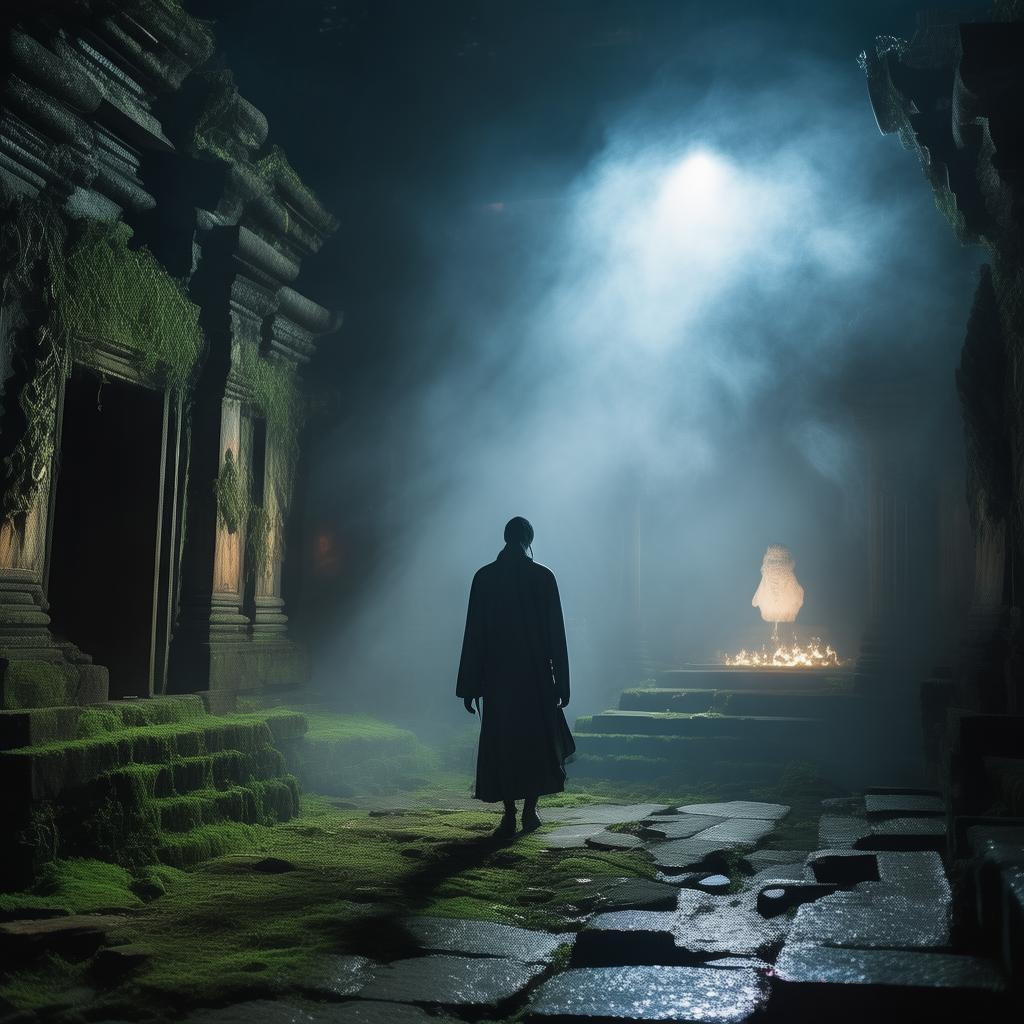The Vanishing Symphony: Echoes of the Abyss
The city of Aether had always been a place of contrasts, where the living and the dead coexisted in a delicate dance. The symphony hall, an architectural marvel at the heart of the city, was one such place where the veil between worlds was as thin as the air in the concert hall.
Dr. Elias Thorne, a renowned conductor of the Aether Symphony, had always believed that music was the language of the soul. But one fateful evening, as he was reviewing the scores for the upcoming season, he stumbled upon an old, leather-bound book hidden beneath the dust in the music library. The title of the book caught his eye: "Echoes of the Abyss: The Listener's Haunting Requiem."
Curiosity piqued, Elias opened the book and began to read. The music was haunting, a mix of beauty and sorrow, as if it had been composed by the hands of a ghost. The notes seemed to pulse with a life of their own, and Elias felt a strange chill run down his spine. As he continued to read, he discovered that the requiem was a piece written by a composer who had disappeared without a trace over a century ago. The composer's final words were etched into the cover of the book: "To those who hear my requiem, prepare for the abyss to call."
The next day, Elias decided to include the requiem in the symphony's upcoming program. The rehearsals went smoothly, but there was an undercurrent of unease among the orchestra. Elias, however, was undeterred. He felt a strange connection to the music, as if it were calling to him.
The night of the performance arrived, and the hall was filled to capacity. The atmosphere was electric, as if the very air itself was charged with anticipation. Elias took the podium, and the orchestra struck up the opening chords of the requiem. The audience was captivated, the music weaving through their souls, creating an indescribable sense of connection.

As the symphony reached its climax, Elias felt a sudden chill. He turned to see a figure standing in the audience, draped in a cloak of shadows. The figure raised a hand, and the music stopped abruptly. Elias's heart raced as he realized that the figure was the composer, the one who had written the requiem. But how could this be? The composer had been dead for over a century.
"Dr. Thorne," the voice echoed through the hall, "you have been chosen to play my requiem. But be warned, the abyss does not take kindly to those who ignore its call."
Elias's mind raced as he tried to process the words. The audience, now on the edge of their seats, watched intently. The composer stepped forward, his eyes glowing with an otherworldly light. "The abyss is real, Dr. Thorne. And it calls to you now. Will you answer?"
Without hesitation, Elias stepped off the podium and walked towards the composer. The music began to play again, but this time it was louder, more intense. The composer reached out and placed a hand on Elias's shoulder. Elias felt a surge of cold energy flow through him, and his vision blurred.
When he opened his eyes, he found himself standing in a dimly lit chamber. The walls were adorned with eerie portraits of faces long forgotten, and the air was thick with a sense of dread. The composer stood before him, his eyes still glowing. "Welcome to the abyss, Dr. Thorne. This is where your journey begins."
Elias's heart pounded as he realized that the abyss was more than a metaphor; it was a place, a realm of the dead. The composer began to sing, and the music around him grew louder, more powerful. Elias's mind was flooded with visions of his past, his mistakes, his regrets. The abyss was not just a place of judgment, but a place of redemption.
As the visions faded, Elias found himself standing alone in the chamber. The composer's voice echoed in his mind. "You have been chosen to lead us out of the abyss, Dr. Thorne. But you must face your fears, confront your regrets, and embrace your humanity."
Elias took a deep breath and began to sing along with the composer, his voice blending with the haunting melody. The music grew stronger, and the walls began to crumble. Elias reached out and touched a portrait, and to his astonishment, the image of the composer smiled warmly.
The music reached its peak, and Elias felt a surge of energy flow through him. The abyss began to recede, and Elias was able to see the real world again. The composer vanished, leaving behind a sense of peace and clarity.
Elias returned to the symphony hall, and the audience erupted into applause. He took the podium and conducted the symphony once more, but this time, the music was different. It was filled with a sense of hope and resilience.
The performance ended, and Elias took a bow. The audience stood and cheered, their faces alight with emotion. Elias looked out at them, and he realized that the abyss had not only changed him but had also changed the way he saw the world.
The Vanishing Symphony had not just been a performance; it had been a journey, a journey into the depths of the human soul and back. And as Elias walked off the stage, he knew that the abyss would always be there, calling to those who dared to listen.
✨ Original Statement ✨
All articles published on this website (including but not limited to text, images, videos, and other content) are original or authorized for reposting and are protected by relevant laws. Without the explicit written permission of this website, no individual or organization may copy, modify, repost, or use the content for commercial purposes.
If you need to quote or cooperate, please contact this site for authorization. We reserve the right to pursue legal responsibility for any unauthorized use.
Hereby declared.









